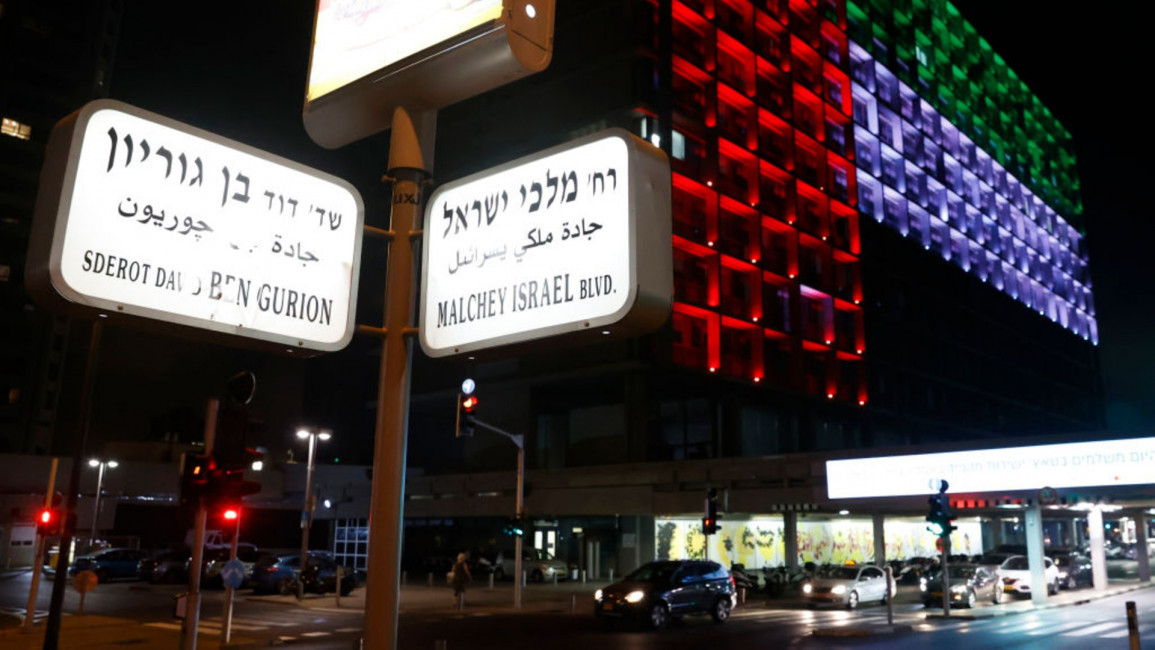
UAE adds Israel to its coalition of anti-democratic allies
If there was any notion in the mind of Crown Prince Mohammed bin Zayed (MBZ) that the so-called 'Abraham Accords' - the name given to the UAE's Trump-brokered normalisation of relations with Israel - would lead to some form of regional parity with Tel Aviv, it has quickly been dispelled.
Israel has long held a veritable veto power over who can and can't sell and acquire weapons in the region. If it can stop Germany selling submarines to its close and now decades-old ally Egypt, it can stop the UAE, its newest ally, from acquiring F-35 stealth capability fighter jets. And this is precisely and unsurprisingly what it has done, leading to an early diplomatic bump in the road between the region's latest tyrannical bedfellows.
We know why Israel does this - its paranoia over "Arab armies" gaining even remote military equality is well established, even when such armies, such as those of its two older formal regional allies Egypt and Jordan, don't have a single inclination to threaten Israel.
But the fact that has happened so early in the budding relationship between Israel and the UAE tells us more about the Emirati motivations behind the deal. Despite MBZ's tweets and Emirati officials' weasel words, we know that it has nothing to do with halting Israel's illegal annexation of the West Bank; indeed, the UAE could very well have provided Israel with an "Arab fig leaf" for its stuttering but aggressive annexationist agenda.
Though Israel won't cede an inch of its nuclear-bolstered hegemony to any force in the region, friend or foe, the convergence between the UAE and Israel ought to be seen through the lens of ideology and geopolitics. Squabbles about F-35s aside, the UAE and Israel ultimately have the same agenda, namely to maintain a regional order that allows autocratic monarchies and ethnocratic supremacists to flourish.
 |
Squabbles about F-35s aside, UAE and Israel ultimately have the same agenda |  |
An order where Palestinians, Yemenis, Egyptians, Syrians, Bahrainis and Libyans, all fighting for their liberty, can be crushed by their oppressors and ignored by the world. Just days after the announcement of the Abraham Accords, Israel recommenced ferocious airstrikes on the besieged Gaza strip, as Palestinians continue to offer some resistance to Israel's tightening of the brutal siege.
Though the spectre of al-Qaeda and Islamic State (IS) is conjured as much as possible, both the UAE and Israel share a particular hatred not of Salafi-Jihadism, but of would-be democrats, reformers and revolutionaries. Given Hamas' historic links to the Muslim Brotherhood and Islamic democracy, as is evident from its democratic demeanour before the attempted coup on it, it's safe to say that the UAE and Israel have a similar level of disdain for the group.
Twitter Post
|
Both fear in actors like Hamas not their "extremism", but rather their moderation in the face of their own respective extremisms: Israel fears Hamas' "peace offensive" (its stated support for a two-state solution) and the UAE fears its place in what it identifies as a regional network of "Islamic democracy" that would see autocracy in the region overturned.
Nowhere has this dynamic been more apparent than in Yemen. From the beginning of the now lost democratic revolution in that country, the UAE was willing to support counter-revolution to stop a democracy cropping up in the region.
When Saudi Arabia began to move against the Houthis, the UAE decided that perpetual war and support for separatism would be more advantageous to its economic and political interests. After all, one of the most influential democratic actors on the ground in Yemen is Al-Islah, which is of course affiliated to the hated Brotherhood.
Read more: 'Deal of shame': UAE formally endorses Israel's occupation of Palestine
In Egypt, there is now definitive evidence that the UAE aided Egyptian counter-revolutionaries in overthrowing the democratically elected Mohamed Morsi, with it investing billions of dollars in Sisi's mass murderous transition towards counter-revolutionary totalitarianism.
The UAE, along with its partner Saudi Arabia, imposed a blockade on Qatar due to it breaking with the Gulf script, so to speak. While the UAE had viciously opposed movements for democracy and liberty in the Arab Spring era, Qatar took a different approach, aiding and welcoming particularly Brotherhood-affiliated proponents of Islamic democracy across the Arabic-speaking world.
The blockade was supposed to break Qatar, forcing it into subservience to the Emirati-Saudi agenda in the region. But it has been a failure, devoid of support among the international community, while the barbaric villainy of Saudi Arabia and the UAE has become clear.
We know now that the UAE and Saudi Arabia were willing to launch a military invasion and instigate a coup against Qatar, but this too was thwarted.
It's perhaps no coincidence then, that the Abraham Accords have come after the UAE faced humiliation in Libya, where Turkey once again thwarted its final push to use the forces of Khalifa Haftar to overthrow the UN-recognised Government of National Accord (GNA), which contains forces affiliated with the Brotherhood.
Turkey intervened with boots on the ground and helped the GNA secure an impressive military victory over the rag-tag UAE-Egypt sponsored forces against them.
It's this informal Turkey-Qatar alliance that the UAE hopes to weaken with its normalisation with Israel. So it's ironic that Israel would play a part in stopping the UAE from adding the hi-tech F-35s to its already impressive arsenal of weaponry.
 |
They are rooting for an order where Palestinians, Yemenis, Egyptians, Syrians, Bahrainis and Libyans, all fighting for their liberty, can be crushed by their oppressors |  |
But UAE's machinations in this department have been thwarted. By embracing Israel, the UAE gets to pose as the "reasonable" force in the region - at least to US eyes and ears - willing to reach out to an alleged arch-nemesis. In reality, the UAE has for decades enjoyed informal relations with Israel.
So this is the current geopolitical zeitgeist; the triumph of illiberal, revanchist, anti-democratic actors. The UAE and Israel were, in a sense, made for each other, while, in turn, the global lunge backwards to authoritarianism was made for forces like them.
Netanyahu, while welcoming the Abraham Accords, said it himself, comparing Israel positively to the UAE and invoking the colonialist idea of both states "making the desert bloom".
We've already seen France embrace the UAE's vision for the region, as can be seen by it breaking with most of Europe in supporting Haftar's crusade against democracy, and its domestic attacks on the Brotherhood.
By embracing Israel, the UAE could find even more friends on the international scene who are willing to either turn a blind eye to or support its destructive, sinister agenda for the region, while this agenda could end up shaping the policy of others.
Sam Hamad is an independent Scottish-Egyptian activist and writer.
Join the conversation @The_NewArab
Have questions or comments? Email us at: editorial-english@alaraby.co.uk
Opinions expressed in this article remain those of the author and do not necessarily represent those of The New Arab, its editorial board or staff.




